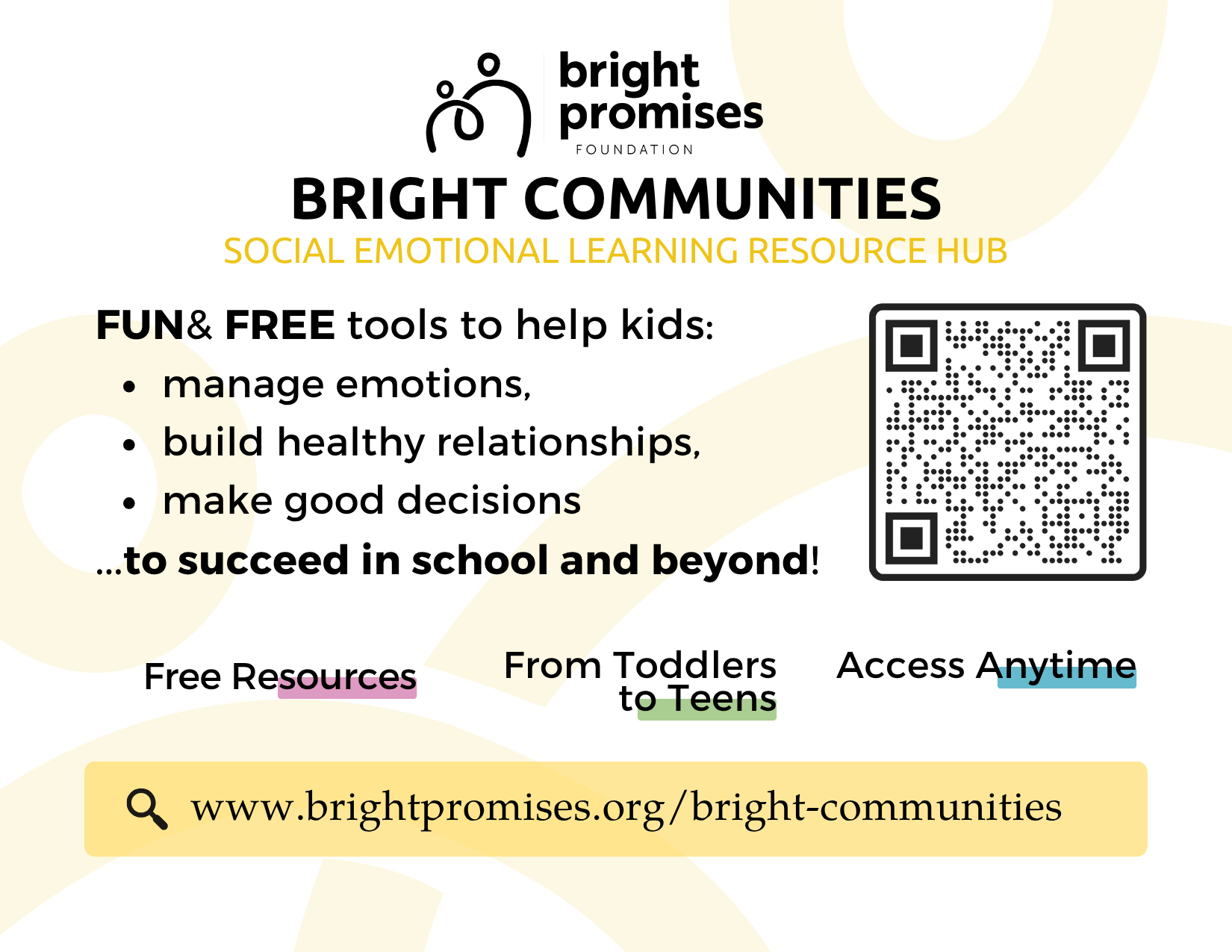Coping with the COVID-19 Crisis: How Social Emotional Learning Helps in Times of Stress
Tips for Families During the COVID-19 Crisis:
How Social Emotional Learning Helps in Times of Stress
Adults and children alike can become overly sensitive and reactive in times of heightened stress. Children may be confused with the information they are hearing, and unusual or poor behavior can result from this distress.
Modeling and promoting strong social emotional learning at home can help to mitigate the negative impacts of stress while promoting positive coping skills. Focusing on social emotional learning during times of crisis can help children and parents regain an improved sense of calm and certain aspects of control, improve parent-child communication, and increases safety and stability in the home.

Self Regulation- It is important for adults to help children make sense of what they hear and understand on the news and from social media. Sharing accurate, age appropriate information to minimize anxiety and fear can help children feel calm and better equipped to deal with stress.
- Give kids simple instructions for how to keep themselves and others healthy
- Make time for self-care. Model actions that are helpful for calming the body and the mind like deep breathing, visualization, and physical exercise.

Recognition of Feelings- Children may have strong, uncomfortable feelings around fear of becoming sick, or loved ones becoming ill. Relay that it is natural to feel unsure and nervous in these circumstances. Help children use language to express discomfort rather than acting out or internalizing their feelings.
- Talk about what actions are being taken to ensure their safety and well-being. Convey and model feelings of assuredness and hope. Remain calm and reassuring as children will react to both what you say and how you say it.
- Take time to talk to children and answer their questions in a calm, assured manner. Children will look to you for cues for how to respond as you are communicating with them and with others.

Sense of Hope and Community- Try to follow usual routines, adding any protocol for safe practice. Routine helps us feel calm!
- Tell children about actions that they can control to minimize risk of becoming sick, and about actions others are taking (parents, educators, scientists, doctors, etc.) to ensure the health and safety of our communities.
- Share stories and examples of how others (historic, locally, personally) have successfully managed fear, anxiety, sickness to bolster confidence and positivity in children.
How You Can Help Low-income Children during the COVID-19 Outbreak
Coronavirus threatens low-income children, families, and the organizations that serve them in extraordinary ways. Hundreds of thousands of children and babies from low-income families in Metropolitan Chicago could face severe risks of hunger, homelessness, and other dangers as the virus spreads. We must act now to combat the immediate and long-term educational, economic, and health effects that low-income and their families are facing.
The Bright Promises COVID-19 Response Fund is a fast-action response fund created to support the immediate needs of low-income families while also providing a lifeline to the agencies serving low-income families to ensure that the organizations and infrastructure necessary for recovery remain intact. Please consider a donation to ensure low-income children and their families receive the help they need during these uncertain and complex times. Learn more and make a donation here.
Resources: Self Care and Social Emotional Learning during COVID-19 Outbreak
- Talking to Children About COVID-19 (Coronavirus) (via National Association of School Psychologists)
- Supporting Mental Health at Home: Activities, Worksheets, and Resources for Families (via Move This World)
- Taking Care of Your Emotional Health (via Center for Disease Control)
- Tips For Social Distancing, Quarantine, And Isolation During An Infectious Disease Outbreak (via SAMHSA - Substance Abuse and Mental Health Services Administration)
Additional Resources:
- U.S. Department of Education COVID-19 Resources
- Stop the spread of germs – help prevent the spread of respiratory viruses like COVID-19
Download the "How Social Emotional Learning Helps in Times of Stress" Fact Sheet
Tips for Families During the COVID-19 Crisis:
How Social Emotional Learning Helps in Times of Stress
Adults and children alike can become overly sensitive and reactive in times of heightened stress. Children may be confused with the information they are hearing, and unusual or poor behavior can result from this distress.
Modeling and promoting strong social emotional learning at home can help to mitigate the negative impacts of stress while promoting positive coping skills. Focusing on social emotional learning during times of crisis can help children and parents regain an improved sense of calm and certain aspects of control, improve parent-child communication, and increases safety and stability in the home.

Self Regulation- It is important for adults to help children make sense of what they hear and understand on the news and from social media. Sharing accurate, age appropriate information to minimize anxiety and fear can help children feel calm and better equipped to deal with stress.
- Give kids simple instructions for how to keep themselves and others healthy
- Make time for self-care. Model actions that are helpful for calming the body and the mind like deep breathing, visualization, and physical exercise.

Recognition of Feelings- Children may have strong, uncomfortable feelings around fear of becoming sick, or loved ones becoming ill. Relay that it is natural to feel unsure and nervous in these circumstances. Help children use language to express discomfort rather than acting out or internalizing their feelings.
- Talk about what actions are being taken to ensure their safety and well-being. Convey and model feelings of assuredness and hope. Remain calm and reassuring as children will react to both what you say and how you say it.
- Take time to talk to children and answer their questions in a calm, assured manner. Children will look to you for cues for how to respond as you are communicating with them and with others.

Sense of Hope and Community- Try to follow usual routines, adding any protocol for safe practice. Routine helps us feel calm!
- Tell children about actions that they can control to minimize risk of becoming sick, and about actions others are taking (parents, educators, scientists, doctors, etc.) to ensure the health and safety of our communities.
- Share stories and examples of how others (historic, locally, personally) have successfully managed fear, anxiety, sickness to bolster confidence and positivity in children.
How You Can Help Low-income Children during the COVID-19 Outbreak
Coronavirus threatens low-income children, families, and the organizations that serve them in extraordinary ways. Hundreds of thousands of children and babies from low-income families in Metropolitan Chicago could face severe risks of hunger, homelessness, and other dangers as the virus spreads. We must act now to combat the immediate and long-term educational, economic, and health effects that low-income and their families are facing.
The Bright Promises COVID-19 Response Fund is a fast-action response fund created to support the immediate needs of low-income families while also providing a lifeline to the agencies serving low-income families to ensure that the organizations and infrastructure necessary for recovery remain intact. Please consider a donation to ensure low-income children and their families receive the help they need during these uncertain and complex times. Learn more and make a donation here.
Resources: Self Care and Social Emotional Learning during COVID-19 Outbreak
- Talking to Children About COVID-19 (Coronavirus) (via National Association of School Psychologists)
- Supporting Mental Health at Home: Activities, Worksheets, and Resources for Families (via Move This World)
- Taking Care of Your Emotional Health (via Center for Disease Control)
- Tips For Social Distancing, Quarantine, And Isolation During An Infectious Disease Outbreak (via SAMHSA - Substance Abuse and Mental Health Services Administration)
Additional Resources:
- U.S. Department of Education COVID-19 Resources
- Stop the spread of germs – help prevent the spread of respiratory viruses like COVID-19
Download the "How Social Emotional Learning Helps in Times of Stress" Fact Sheet








.svg)

